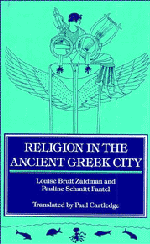Book contents
- Frontmatter
- Contents
- List of illustrations
- Author's preface to the English translation
- Translator's introduction
- List of sources
- PART I Introduction: How should we study Greek civic religion?
- 1 The necessity of cultural estrangement
- 2 Some fundamental notions
- 3 Sources of evidence
- PART II Cult-practices
- PART III Systems for representing the divine
- PART IV Envoi
- Appendixes
- Bibliography
- Index
1 - The necessity of cultural estrangement
Published online by Cambridge University Press: 05 June 2012
- Frontmatter
- Contents
- List of illustrations
- Author's preface to the English translation
- Translator's introduction
- List of sources
- PART I Introduction: How should we study Greek civic religion?
- 1 The necessity of cultural estrangement
- 2 Some fundamental notions
- 3 Sources of evidence
- PART II Cult-practices
- PART III Systems for representing the divine
- PART IV Envoi
- Appendixes
- Bibliography
- Index
Summary
UNFAMILIAR TERRITORY
The study of Greek religion requires a preliminary mental readjustment: we must temporarily abandon familiar cultural territory and radically question received intellectual categories. Greek society was fundamentally different from our own, and the concepts that we employ to describe contemporary religious phenomena are necessarily ill adapted to the analysis of what the Greeks regarded as the divine sphere. Besides, the function of religion cannot be the same in a society such as ours, in which communal life is very largely secularized, and in one where religion was thoroughly intertwined with all areas of public and social interaction. We have, moreover, to disabuse ourselves of the notion of a disembodied ‘essence’ of religion; for only then can we treat religion as a subject for enquiry like any other, one that has a history.
The extent to which Greek religion is alien territory for us may be grasped in a preliminary way by considering the main conclusions of J.-P. Vernant's concise comparison of the beliefs of the ancient Greeks with those of a Western, still christianized culture (Vernant 1991[42]: 272–3). For ‘us’, the divine (in the form of a transcendent God) is external to the world, it has created the world and mankind, it is present within mankind, and it is confined, lastly, to its own sharply defined sphere within everyday life.
- Type
- Chapter
- Information
- Religion in the Ancient Greek City , pp. 3 - 7Publisher: Cambridge University PressPrint publication year: 1992



